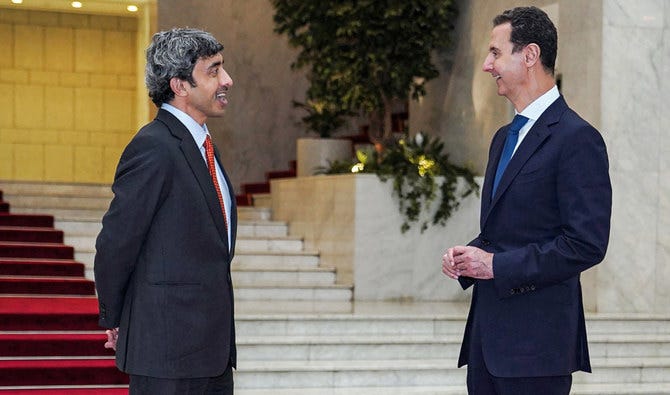Can Assad ever stand up to Iran?
Syrian autocrat is too weak to influence events, if he abandons Iran, he dies
United Arab Emirates (UAE) Foreign Minister Abdullah bin Zayed visited Damascus and met with Syrian President Bashar Assad, inaugurating a seemingly a new Gulf Countries Council (GCC) policy of peeling Assad away from Iran. In 2010, before Assad had been substantially weakened by a decade of civil war, Saudi Arabia led a similar effort. It led nowhere and there is no reason to believe that the UAE’s push today will bear fruit.
The alliance between Syria and Iran dates back to 1980. Late Syrian President Hafez Assad, Bashar’s father, was locked in a bitter rivalry with his Iraqi counterpart Saddam Hussein. When war broke out between Iraq and Iran. Assad took Tehran’s side and an alliance start emerging.
Hafez Assad was not an ideologue but a savvy politician who understood that small countries with meager resources, like Syria, could only leverage their position by making themselves useful to bigger powers. Whenever big powers raced to win him over, he hiked his prices and sold to the highest bidder.
In 1987, Iran launched its last ditch, major offensive, against the southern Iraqi city of Basra. Gulf countries were frightened that the fall of Basra would open the way for Islamic Iran to invade them. GCC threw its lot behind Saddam, providing him with immense financial and diplomatic support.
Iran also needed allies, especially among the Arabs, to justify its attack on an Arab city. Assad was Tehran’s closest friend. However, instead of offering his help, Assad delivered a speech playing up Arab unity and ordered his troops in Beirut to storm Hezbollah’s headquarters and kill a dozen militants. Assad won favor with the West and Gulf countries, while Iran was still desperate for his friendship.
In in the midst of it Iraqi quagmire, Iran deployed its diplomats to Damascus to reason with Assad. After keeping them waiting for days, Assad finally met the Iranians and dictated his terms. Iran’s proxy in Lebanon, Hezbollah, can only operate with permission from Assad. From then on, whenever Assad wanted to blackmail the West, he would let Hezbollah attack Israel and spread global terrorism. American envoys would visit Damascus begging for Assad’s help, which he would offer only after securing concessions to his liking.
Papa Assad became a regional player who punched much higher than his weight. The son, however, did not inherit such talent. Instead of maintaining the balance between rival powers, Assad threw himself in Iran’s arms. His first loss was his ejection from Lebanon, which passed to Hezbollah’s hands. His second loss cost him Syria. Bashar Assad still could not figure it out. Instead of seeking balance, he sought Iranian, and later Russian, military intervention.
After years of losses, Iran’s Hezbollah and Russian air power reversed Assad’s losses. But help was not free. It cost Assad his sovereignty. Hezbollah never handed back to Assad the territory it won back from his opponents. Russia, for its part, rarely consults with Assad and often decides on his behalf.
Since a truce was brokered in 1974 with Israel, Assad the father made himself useful to Israel by keeping his southern border calm. Assad the son, however, lost control over this territory, first to the armed Syrian opposition and later to Hezbollah and Iran. Assad’s retreat forced Israel to conduct its own policing of the Syrian south, striking from the air to prevent Iran from building a military infrastructure with which it can threaten the Jewish state. Whenever Israel strikes, Assad watches, his media issues press statements promising retaliation.
Assad is weak and barely governs beyond his presidential palace in Damascus and his Alawite pocket in the north. Even among the Alawites, Moscow has recruited its people for when Assad turns against Russia, if ever.
Similarly, Hezbollah has become so entrenched inside Syria, including in Damascus, that if Assad ever tries to switch sides and join Iran’s rivals, the GCC, Tehran can kill the Syrian dictator.
Iran has a proven record in eliminating former friends and allies, In 2005, Lebanese Prime Minister Rafic Hariri was killed. A UN tribunal indicted top Hezbollah leaders on charges of his assassination. In 2017, after years of alliance with former Yemeni President Ali Abdullah Saleh against the Yemeni government and its GCC supporters, Iran’s proxy militia in Yemen killed Saleh while he was on his way to the part of the country free from Iranian control.
In Iraq, after having received support for his premiership and visited Tehran where he met Supreme Leader Ali Khamenei, Iraqi Prime Minister Mustafa al-Kadhimi survived an assassination attempt. Reuters quoted sources from pro-Iran Irqqi militias claiming responsibility.
Assad is too weak to influence the course of events in Syria. Even if he were to revolt against his Iranian sponsors, he would probably not survive to see the outcome. The Syrian autocrat knows this, and for this reason all that he has offered so far has been leaks about his presumed “unhappiness” with Iranian control of his territory. It is unlikely that Assad will go any further.




Hi Hussain, many thanks for the brilliant article. What's the political situation now in Syria? There is still war but who are the players? I read there are still 12,000 ISIS prisoners in Syria with turkish militia wanting to free them? If they escape who are they going to align with... Syria is a big mystery and unclear from videos on Twitter who the various factions are?! If you've a chance to write an update I'd be so grateful!
The unthinkable - approach and align with Israel.